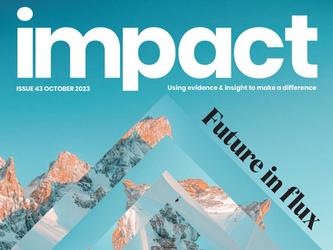Disrupt or be disrupted: Dos and don’ts for global consumer brands

The age of disruptors is upon us. From Netflix shaking up the entertainment media space to Uber upending the global taxi industry, new players are always around the corner, ready to pounce. Incumbents in their respective industries often fail to anticipate these threats because they’re paying attention to the wrong things.
Whether they’re watching big signals but ignoring small ones, or failing to identify what’s truly valuable to people, a lack of adequate foresight means that global consumer brands don’t realise that the new kids are about to eat their lunch – until it’s too late. To truly stand the test of time, global consumer brands need to follow these do’s and don’ts.
Don’t: Get distracted by major industry shifts
A key aspect of practising foresight is being aware of the signals of change impacting your business and acting accordingly. But brands who focus on the big and obvious signals might miss the smaller, more transformative ones that can lead to real differentiation and growth.
Think about travel, and consumers’ evolving expectations of the booking experience. After Covid-19 restrictions eased, travel agents made something of a comeback as consumers struggled with the complexities and risks involved in travel. Even now, the desire for expert curation is still there, and companies like British Airways and EasyJet are tapping into this with new package holiday deals.
But with the rise of AI, this area is about to be wholly disrupted again, and there are weak signals already alerting us to what this could look like.
Do: Stay attuned to smaller, weaker signals
AI will be able to instantly design and book hyper-personalised trips, freeing up time and energy for consumers to focus on other details, such as travel companions and experiences. One implication is that the social status often associated with planning a great trip may go out the window. And by offloading the administrative tasks to AI, consumers will be able to turn their attention to human connection. AI is moving us in a direction that prioritises human relationships and authenticity.
Media brands are also leaning on AI to emphasise the importance of the human touch. For example, streaming service Pluto TV recently ran a brand campaign highlighting the real people responsible for selecting and curating their content, tapping into consumers’ algorithm fatigue.
Don’t: Ignore core consumer needs – present and future
Fundamental consumer needs like safety, fun and autonomy remain constant – along with the need for recognition and equality. AI has the power to level the playing field somewhat, giving consumers equal access to expertise and information.
Historically, the finance industry has not catered well to particular groups – but AI can put financial savvy straight into their hands, allowing them to choose how active or passive they want to be in their financial planning and decision-making.
Do: Help people counter loneliness and find togetherness
Brands are in a position to help solve real social issues through disruptive innovation. Loneliness is a key example: we know from our own data that more than one in four consumers feel at risk of loneliness over the next five years, rising to 40% of Gen Z. Could AI help us find better ways of meeting and connecting with one another?
Community-building in general has also become difficult, particularly in the post-Covid age, and this is another area where brands can step in and facilitate connections. For example, electrical vehicles maker Nio has opened a range of locations called Nio Houses, where customers can work, play, relax and connect with one another.
Don’t: Overvalue sector-centric perspectives
All too often, global brands assume competition will come from within their own industry. But those who look to adjacent sectors can beat disruptors at their own game.
We’re working with a brand in the food space that’s paying close attention to innovation in other sectors – particularly beauty and health. It’s clear that healthcare is ripe for disruption because it doesn’t serve most populations very well, it’s expensive, and it’s not well-distributed. What’s more, it’s difficult for patients to hold their own health records accountable because they are written in indecipherable ‘doctor speak'.
Do: Embrace AI to identify the white space
AI will make finding white space opportunities like this even simpler. For example, it has the potential to turn healthcare from a medical-first proposition into a human-first proposition, allowing people to finally take their health into their own hands. We should expect a similar pattern across all sectors.
We’ll soon see global brands using AI to identify white space opportunities – for example, by mapping existing commercial activity to consumer demand – to protect themselves from disruption, and ensure they are not wasting energy or assets developing things that people don’t actually need.
Don’t: Use foresight as an add-on or afterthought
Every forward-thinking brand should have a chief foresight officer responsible for strategically elevating the issues that matter. But foresight should not be a siloed department or an afterthought. It’s about building a community of individuals who are prepared to show up and engage with the future by design. The global brands that are able to compete with new disruptors are those that build and embed foresight into the organisation as a whole.
Do: Use foresight to ensure that intelligence drives action
Foresight gives global organisations a unified vision of the future, helps them get to the right outcomes, faster – and offers agility in a world where humans and signals are increasingly complex and difficult to decode. Intelligence drives action, bringing value from pilot to launch.
Global brands with foresight at their fingertips can anticipate disruption and use this knowledge as a road map for future innovation success. By anticipating the needs of their future consumer, foresight-led businesses can successfully navigate through disruption and uncertainty towards growth, no matter what the future holds.
Meabh Quoirin is chief executive and co-owner at Foresight Factory

We hope you enjoyed this article.
Research Live is published by MRS.
The Market Research Society (MRS) exists to promote and protect the research sector, showcasing how research delivers impact for businesses and government.
Members of MRS enjoy many benefits including tailoured policy guidance, discounts on training and conferences, and access to member-only content.
For example, there's an archive of winning case studies from over a decade of MRS Awards.
Find out more about the benefits of joining MRS here.













0 Comments